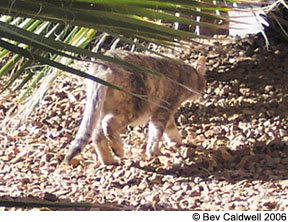Its six oclock in the evening and youve just gotten home from a nasty commute, but when you walk in the front door expecting kitty to be expectantly waiting, shes not there. A thorough search yields only one clue – a window screen pushed ajar – and no cat. Your kitty isnt wearing a collar, because shes an indoor cat, so shes loose and unidentifiable. Now what?

288
It could be time to call a missing animal response (MAR) search team – a dog and handler team trained specifically to find your lost cat.
Cat Trackers
MAR-trained search dogs are trained to find both cats and dogs; however, in order to qualify as a cat search dog, the canine must be crazy about cats, says Kathy (Kat) Albrecht, the designer of the MAR training program, a 15-year veteran of search and rescue (SAR) and a retired police bloodhound handler. These are the dogs that pine for kitties, she says, adding that when a potential cat-search dog spies a cat, it gives a happy, wiggly, Oh, I love you! type of response.
In addition to being kitty-friendly, prospective MAR dogs must also have the same skills required of SAR dogs, which are trained to find missing people: a great sense of smell (and the desire to use the nose) and an incredible drive to play. The reward for finding the kitty is the MAR-trained dogs favorite toy, relates Albrecht, author of The Lost Pet Chronicles: Adventures of a K-9 Cop Turned Pet Detective.
Albrecht notes that the indoor cat that accidentally gets loose outdoors is automatically considered to be in unfamiliar territory, which is frightening to even the boldest cat. Therefore, most indoor cats, whether self-confident or timid, will initially hide – and the hiding spot is generally close by (even under your own home) unless the cat has been chased further by a dog or another animal.
Albrecht offers these tips for the initial search for a lost housecat:
Missing posters work for bolder cats. The bolder the cat, the less time it will spend in hiding, says Albrecht. If a gregarious cat cant find its way home, this I-dont-know-a-stranger feline may walk the neighborhood, looking for rubs and maybe a free meal. Because a friendly cat will be the most visible, this is the cat that is most likely to be found by asking neighbors and posting MISSING signs on corner light posts.
Humane traps may be the best option for timid cats. A very timid cat could remain in hiding for weeks, says Albrecht, which means no one will see this kitty – so MISSING posters will do no good. By the time a week has past, says Albrecht, the shy cat may edge out of its cubby because of severe hunger and thirst. Often the best way to lure this cat out of hiding earlier is to set humane traps in likely areas, which can include neighbors yards.
Do your own searching. Its not good enough to ask a neighbor to check their yard for your cat, says Albrecht, noting that the neighbor is going to take a cursory look over the yard (at best) but is not going to search any inconvenient, hard-to-get-to locations. Instead, Albrecht suggests asking if you can search for your cat in the neighbors yard.
If you hire a pet detective, make sure that the dog and handler are certified. Training a dog to search for missing pets takes just as much effort as training a dog to search for a missing person. Unfortunately, with any great idea there are going to be people who try to take advantage of the situation. There have been reports of individuals putting vests (signifying a search dog) on untrained dogs and charging significant sums of money to search for missing pets, warns Albrecht. Before hiring anyone to find your kitty, make sure you check the individuals credentials and call his or her references.
Doing enough background research on a dog and handler team can be particularly difficult, acknowledges Albrecht, because emotions run high when a cat goes missing. So you may want to find out ahead of time who offers this service in your area – just as you should take a clear photograph of your cat and keep it in a file or desk drawer, ready to be photocopied for posters and shown to neighbors.



